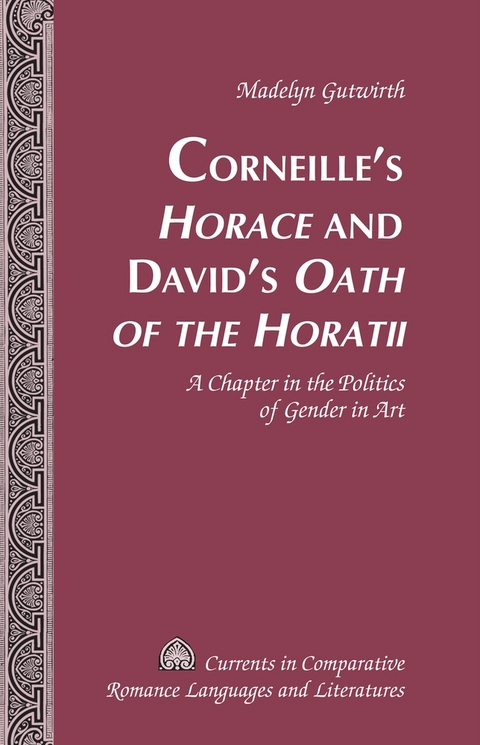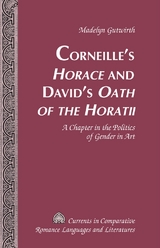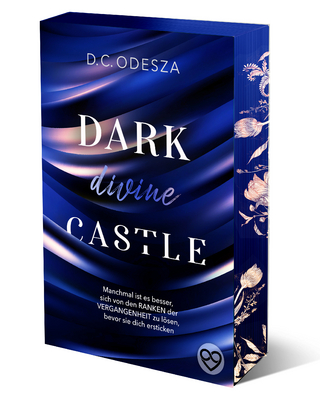Corneille’s «Horace» and David’s «Oath of the Horatii»
A Chapter in the Politics of Gender in Art
Seiten
2011
|
New edition
Peter Lang Publishing Inc (Verlag)
978-1-4331-1425-0 (ISBN)
Peter Lang Publishing Inc (Verlag)
978-1-4331-1425-0 (ISBN)
- Titel z.Zt. nicht lieferbar
- Versandkostenfrei innerhalb Deutschlands
- Auch auf Rechnung
- Verfügbarkeit in der Filiale vor Ort prüfen
- Artikel merken
Corneille's Horace and David's Oath of the Horatii
This book views Jacques-Louis David’s pre-Revolutionary Oath of the Horatii as the realization of political and cultural gender struggle and goes back to antiquity and to Pierre Corneille’s seventeenth-century play Horace to trace major antecedents of David’s work. The play begins with Livy’s account of gender strife in the Roman family of the Horatians. As Horace returns from battle against Alba, he is bitterly reproached by his sister Camille for slaying her Alban fiancé. Outraged, Horace kills her and is subsequently tried by the Roman state and freed. Corneille’s 1640 version of the tale, Horace, appeared during the regency of Queen Anne of Austria, a time that favored the emergence of proto-feminist literature. Written in this atmosphere, Camille plays a powerful role: she thunderously denounces war and state power. Alas, this pro-woman ambiance did not last.
As eighteenth-century France’s sense of moral crisis rose, gender relations became more embattled. The greater presence of women in society evoked a reaction toward gender separation, as medical theorists circumscribed women’s «nature» within sexual and maternal roles. As hysteria and the vapors became common female afflictions, Enlightenment philosophes puzzled over the paradox of women’s condition.
The conflict over «effeminate» rococo and «masculine» neo-classical art illustrates these tensions. David’s milieu embraced a severer Roman, less feminocentric aesthetic. His preparatory sketches for The Oath exhibit hesitation as to how to frame his version of the story, but his final work diminishes women’s stature, not only in the myth, but for the revolutionary generation’s conceptualization of the republic. The work’s huge impact reinforced a gender history in which women’s place in the modern state was decisively relegated to its margins.
This book views Jacques-Louis David’s pre-Revolutionary Oath of the Horatii as the realization of political and cultural gender struggle and goes back to antiquity and to Pierre Corneille’s seventeenth-century play Horace to trace major antecedents of David’s work. The play begins with Livy’s account of gender strife in the Roman family of the Horatians. As Horace returns from battle against Alba, he is bitterly reproached by his sister Camille for slaying her Alban fiancé. Outraged, Horace kills her and is subsequently tried by the Roman state and freed. Corneille’s 1640 version of the tale, Horace, appeared during the regency of Queen Anne of Austria, a time that favored the emergence of proto-feminist literature. Written in this atmosphere, Camille plays a powerful role: she thunderously denounces war and state power. Alas, this pro-woman ambiance did not last.
As eighteenth-century France’s sense of moral crisis rose, gender relations became more embattled. The greater presence of women in society evoked a reaction toward gender separation, as medical theorists circumscribed women’s «nature» within sexual and maternal roles. As hysteria and the vapors became common female afflictions, Enlightenment philosophes puzzled over the paradox of women’s condition.
The conflict over «effeminate» rococo and «masculine» neo-classical art illustrates these tensions. David’s milieu embraced a severer Roman, less feminocentric aesthetic. His preparatory sketches for The Oath exhibit hesitation as to how to frame his version of the story, but his final work diminishes women’s stature, not only in the myth, but for the revolutionary generation’s conceptualization of the republic. The work’s huge impact reinforced a gender history in which women’s place in the modern state was decisively relegated to its margins.
Madelyn Gutwirth, Professor Emerita of French and Women’s Studies at West Chester University, received her BA from Brooklyn College and her MA and her PhD from Bryn Mawr College. She is author of Madame de Staël, Novelist: The Emergence of the Artist as Woman (1978) and co-editor (with Avriel Goldberger and Karyna Szmurlo) of Germaine de Staël: Crossing the Borders (1991). Her Twilight of the Goddesses: Women and Representation in the French Revolutionary Era (1992) was awarded Honorable Mention in competition for the Louis Gottschalk Prize by the American Society for Eighteenth-Century Studies in 1993. She has been a Fellow of the American Council of Learned Societies and the National Humanities Center.
| Reihe/Serie | Currents in Comparative Romance Languages and Literatures ; 191 | Currents in Comparative Romance Languages and Literatures ; 191 |
|---|---|
| Verlagsort | New York |
| Sprache | englisch |
| Maße | 160 x 230 mm |
| Gewicht | 300 g |
| Themenwelt | Literatur ► Lyrik / Dramatik ► Dramatik / Theater |
| Kunst / Musik / Theater ► Kunstgeschichte / Kunststile | |
| Geisteswissenschaften ► Sprach- / Literaturwissenschaft ► Anglistik / Amerikanistik | |
| Geisteswissenschaften ► Sprach- / Literaturwissenschaft ► Literaturgeschichte | |
| Geisteswissenschaften ► Sprach- / Literaturwissenschaft ► Romanistik | |
| Sozialwissenschaften ► Soziologie ► Gender Studies | |
| Schlagworte | literture, History, Criticism, Art History, Gender, Women's Studies, Myth |
| ISBN-10 | 1-4331-1425-9 / 1433114259 |
| ISBN-13 | 978-1-4331-1425-0 / 9781433114250 |
| Zustand | Neuware |
| Informationen gemäß Produktsicherheitsverordnung (GPSR) | |
| Haben Sie eine Frage zum Produkt? |
Mehr entdecken
aus dem Bereich
aus dem Bereich




